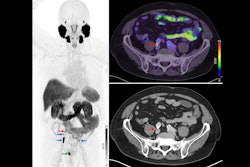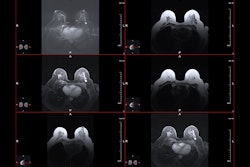The following is the list of candidates for the 2025 edition of the Minnies, AuntMinnie.com's campaign to recognize the best and brightest in medical imaging. This year, well over 100 candidates have been selected as semifinalists for 14 categories, ranging from Most Influential Radiology Researcher to Best New Radiology Device for the period of September 1, 2024 to September 1, 2025.

The semifinalist list was compiled based on nominations from members of AuntMinnie.com. Winners will be selected by our expert panel in two rounds of voting. The finalists will be announced in late October, followed by the winners in early November.
Most Influential Radiology Researcher
Manisha Bahl, MD, Harvard Medical School
Richard Barr, MD, PhD, Northeast Ohio Medical University
David Bluemke, MD, PhD, University of Wisconsin-Madison
Rajesh Botchu, MD, Royal Orthopaedic Hospital Birmingham
Tyler Bradshaw, PhD, University of Wisconsin-Madison
Eric Christensen, PhD, Harvey L. Neiman Health Policy Institute
Linda Chu, MD, Johns Hopkins Medicine
Damini Dey, PhD, Cedars-Sinai Medical Center
Elizabeth Dibble, MD, Brown University Warren Alpert Medical School
Florence Doo, MD, University of Maryland School of Medicine
Fiona Gilbert, MD, University of Cambridge
Kate Hanneman, MD, University of Toronto
Christiane Kuhl, MD, PhD, RWTH Aachen University
Negar Omidvari, PhD, University of California, Davis
Perry Pickhardt, MD, of the University of Wisconsin-Madison
Peter Scott, PhD, University of Michigan
Rebecca Smith-Bindman, MD, University of California, San Francisco
Katherine Zukotynski, MD, PhD, McMaster University
Most Effective Radiology Educator
Lea Alhilali, MD, Barrow Neurological Institute
Suzie Bash, MD, Radnet
Ali Cahid Civelek, MD, Johns Hopkins Medicine
Ghaneh Fananapazir, MD, University of California, Davis
Elliot Fishman, MD, Johns Hopkins Medicine
Lynn Francesconi, PhD, Hunter College - CUNY
Frank Gaillard, MD, Radiopaedia
Matthew Hartman, MD, Allegheny Health Network
Saurabh Jha, MD, University of Pennsylvania School of Medicine
Nina Kottler, MD, Radiology Partners
Suzanne Lapi, PhD, University of Alabama at Birmingham
Kira Melamud, MD, NYU Langone
Tanya Moseley, MD, University of Mississippi Medical Center
Ashwin Singh Parihar, MD, Mallinckrodt Institute of Radiology
Tharani Putta, MD, AIG Hospitals, India
Manuel Signorini, Università degli Studi di Padova
Benjamin H. Taragin, MD, University of Pennsylvania School of Medicine
Michael Albert Thomas, PhD, UCLA Health
Vani Vijayakumar, MD, University of Mississippi
Most Effective Radiologic Sciences Educator
Asher Beam, University of Mississippi Medical Center
Colleen Dempsey, Thomas Jefferson University
Tobias Gilk, Gilk Radiology Consultants
Kellye Mantooth, RT, UTMCK School of Radiography and Metrasens
Kristi Moore, PhD, RT (R), University of Mississippi Medical Center
Joy Renner, RT (R), University of North Carolina -- Chapel Hill
Kori Stewart, PhD, Quinnipiac University, Hamden, CT
Jennifer Thompson, EdD, Austin Peay State University
Most Effective Radiology Administrator/Manager
Melissa Bonassisa, RWBJH Jersey City Medical Center
Ashley Darby, University of Mississippi Medical Center
Jamie Dennis, Emory Johns Creek Hospital
Terri Franklin, University of Alabama – Birmingham
Frederick Lee, Alameda Health System
Billie McKee, East Memphis Imaging Center
Carly Nicholson, Virginia Mason Franciscan Health
Ashley Perkins, Franciscan Health Central Indiana
Kasi Rether, OhioHealth
Jose Rodriguez, University of Kansas Health System
Marcy Saniuk, Nebraska Medicine
Mark Steffen, University of Southern California
Best Radiologist Training Program
Allegheny Health Network, Pittsburgh, PA
Creighton University School of Medicine -- Phoenix, AZ
Emory University, Atlanta
Harvard Medical School – Massachusetts General Hospital, Boston
New York University, New York City
University of California, San Francisco
University of Pennsylvania, Philadelphia
Stanford University, Stanford, CA
Best Radiologic Sciences Program
Arkansas State University, Jonesboro, AR
Austin Peay State University, Clarksville, TN
John Patrick University of Health and Applied Sciences, South Bend, IN
Johns Hopkins University, Baltimore, MD
Mayo Clinic School of Health Sciences, Rochester, MN
The Ohio State University, Columbus, OH
Quinnipiac University Radiologic Sciences Program, Hamden, CT
Stanford University, Stanford, CA
Thomas Jefferson University, Philadelphia, PA
Most Significant News Event in Radiology
Aetna, UnitedHealthcare sue Radiology Partners
China limits exports of rare elements, targets CT x-ray tubes
AI industry consolidation
FDA begins phasing out animal studies for PET drugs
First x-ray image taken in space
Growing interest in whole-body MRI
Impact of U.S. National Institutes of Health (NIH) funding cuts on medical imaging research community
Man dies after being pulled into MRI machine
Medicare finalizes 2025 Fee Schedule Cut
Supply shortages of Tc-99m in late 2024
USPSTF boosts DEXA in osteoporosis screening
U.S. Supreme Court overturns Kennedy v. Braidwood ruling
Biggest Threat to Radiology
Increased imaging volumes
Lower Medicare reimbursement
NIH funding cuts to medical imaging research
Private equity/corporatization of radiology
Radiologist burnout
Radiology workforce shortages
Slow adoption rate for AI
Tariffs
Hottest clinical procedure
3D printing
Agentic AI
Cardiac CT
Cinematic rendering
CT colonography
Contrast-enhanced mammography
F-18 flurpiridaz PET
Remote MRI
Theranostics
Whole-body MRI screening
Image of the Year
AI model detects low BMD on ankle and foot x-rays. Image from Farid Gharehmohammadi, MD, and Ronnie Sebro, MD, of MD Anderson Cancer Center, et al.
CT reveals changes in lung holes in emphysema patients. Image from Yura Ahn, MD, of the University of Ulsan in South Korea, et al.
DTI-MRI shows childhood neglect’s effect on the brain’s white matter. Image from Natasha Kawata, MD, of the University of Fukui in Japan, et al.
First x-ray image taken in space. Image from Chun Wang, et al.
MRI model predicts treatment response for triple-negative breast cancer. Image from Toulsie Ramtohul, MD, of the Curie Institute France, et al.
New immuno-PET tracer for measuring PD-L1 expression in patients with head and neck cancers. Image from Yong Wang, MD, of Shandong Medical University in China, et al.
New PET tracer developed for breast cancer. Image from Li Sun, MD, of Fudan University Shanghai Cancer Center in China, et al.
PET scans identify people at early risk for cognitive decline. Image from Guilherme Kolinger, MD, of Life Molecular Imaging in Germany, et al.
PET tracer images brain inflammation. Image from Jiahui Chen, PhD, of Emory University, et al.
Photon-counting CT bests conventional CT for quantifying coronary plaque. Image from Milán Vecsey-Nagy, MD, PhD, of the Medical University of South Carolina, et al.
Resting-state fMRI analysis reveals impact of blast exposures. Image from Andrea Diociasi, MD, of Mass General Brigham, et al.
SPECT/CT predicts overall survival in Pluvicto patients. Image from Lena Unterrainer, MD, of University Hospital LMU Munich in Germany.
Whole-body PET shows how naloxone blocks opioids. Image from Jacob Dubroff, MD, of the University of Pennsylvania, et al.
Scientific Paper of the Year
AI as an independent second reader in detection of clinically relevant breast cancers within a population-based screening programme in the Netherlands: a retrospective cohort study. Van Winkel, et al, Lancet Digital Health, August 14, 2025. To learn more about this paper, click here.
AI Opportunistic Coronary Calcium Screening at Veterans Affairs Hospitals. Hagopian, et al, NEJM AI, May 16, 2025. To learn more about this paper, click here.
Association between Long-term Exposure to Ambient Air Pollution and Myocardial Fibrosis Assessed with Cardiac MRI. Du Plessis, et al, Radiology, July 1, 2025. To learn more about this paper, click here.
Brain dopamine responses to ultra-processed milkshakes are highly variable and not significantly related to adiposity in humans. Darcey, et al, Clinical and Translational Report, March 4, 2025. To learn more about this paper, click here.
Cannabinoid 1 receptor availability in posttraumatic stress disorder: A positron emission tomography study. Korem, et al, Translational Psychiatry, August 22, 2025. To learn more about this paper, click here.
Comparison of supplemental breast cancer imaging techniques – interim results from the BRAID randomised controlled trial. Gilbert, et al. Lancet, May 31, 2025. To learn more about this paper, click here.
Cost-effectiveness of a novel AI technology to quantify coronary inflammation and cardiovascular risk in patients undergoing routine coronary computed tomography angiography. Tsiachristas, et al, European Heart Journal: Quality of Care and Clinical Outcomes, June 23, 2025. To learn more about this paper, click here.
Evaluating Artificial Intelligence-Assisted Prostate Biparametric MRI Interpretation: An International Multireader Study. Gelikman, et al, American Journal of Roentgenology, July 16, 2025. To learn more about this paper, click here.
First-in-human positron emission tomography study of intranasal insulin in aging and MCI. Sai, et al, Alzheimer's & Dementia: Translational Research & Clinical Interventions, July 23, 2025. To learn more about this paper, click here.
Genicular Artery Embolization for the Treatment of Symptomatic Knee Osteoarthritis. Fleckenstein, et al, Radiology, July 22, 2025. To learn more about this paper, click here.
Greater Neuroimmune System Deficit in Women Than Men with Alcohol Use Disorder. Zakiniaeiz, et al, Biological Psychiatry, May 22, 2025. To learn more about this paper, click here.
Multimodal AI to forecast arrhythmic death in hypertrophic cardiomyopathy. Lai, et al, Nature Cardiovascular Research, July 2, 2025. To learn more about this paper, click here.
Nociception During Iodinated Contrast Medium Infusia on in Computed Tomography: Neurophysiological Mechanisms and Clinical Implications. Scappatura, et al, Journal of Advanced Health Care, March 5, 2025. To learn more about this paper, click here.
Non-Risk-Based Lung Cancer Screening With Low-Dose Computed Tomography. Li, et al, JAMA, April 21, 2025. To learn more about this paper, click here.
Opportunistic Use of Chest X-Ray for Identifying Older Adults at risk for Osteoporosis and not Meeting Criteria for Screening. Chinapuvvula, et al, Journal of Primary Care & Community Health, July 14, 2025. To learn more about this paper, click here.
Private Equity Acquisitions of Radiology Practices from 2013 to 2023: National- and State-Level Analyses. Khunte, et al, American Journal of Roentgenology, March 5, 2025. To learn more about this paper, click here.
Projected Lifetime Cancer Risks From Current Computed Tomography Imaging. Smith-Bindman, et al, JAMA Internal Medicine, April 14, 2025. To learn more about this paper, click here.
Quantifying the Opportunity and Economic Value of Bone Density Screening Using Opportunistic CT: A Medicare Database Analysis. Gyftopoulos, et al, Journal of the American College of Radiology, March 3, 2025. To learn more about this paper, click here.
Rates of PSMA PET Staging and Positivity in Newly Diagnosed Prostate Cancer in a National Health Care System. Miller, et al, Journal of Nuclear Medicine, January 3, 2025. To learn more about this paper, click here.
Restriction Spectrum Imaging as a Quantitative Biomarker for Prostate Cancer With Reliable Positive Predictive Value. Rojo Domingo, et al, Journal of Urology, May 16, 2025. To learn more about this paper, click here.
The use of artificial intelligence to improve detection of acute incidental pulmonary emboli. Kuzo, et al, Journal of Thrombosis and Haemostasis, August 4, 2025. To learn more about this paper, click here.
Unveiling rare earth elements in beers: evidence for gadolinium contamination. Bordeneuve-Pérès, et al, Food Chemistry, August 21, 2025. To learn more about this paper, click here.
Best New Radiology Device
Adora DRFi radiographic and fluoroscopic imaging system, Canon Medical Systems USA.
AeroDR PDR wireless digital flat-panel detector, Konica Minolta Healthcare Americas
FDR Go iQ portable DR system, Fujifilm Healthcare Americas
InVision 3T Recharge MRI scanner, IMRIS
Lumen HD Pro DR detector, Varex Imaging
Magnetom Flow.Ace 1.5T MRI scanner, Siemens Healthineers
MC2 portable x-ray system, Oxos Medical
MyLab A70 ultrasound scanner, Esaote
Nanox.ARC X digital tomosynthesis system, Nanox
Pharos PET scanner, Brightonix
PocketVu handheld ultrasound devices, SuperSonic Imagine
PositView SET-5002 head and breast PET scanner, Shimadzu
Resona 18 ultrasound system, Mindray
Signa Sprint ultrapremium wide-bore 1.5-tesla scanner, GE HealthCare
uAngio Aviva interventional x-ray system, United Imaging
UroNav image fusion system, Philips
Z20 AI-powered ob/gyn ultrasound scanner, Samsung Medison
Best New Radiology Software
AI Abdomen ultrasound software, Siemens Healthineers
AI-powered radiology software platform, New Lantern
Atrena advanced visualization image viewer, Ziosoft
CancerIQ Reach, CancerIQ
Carestream 360 analytics dashboard, Carestream Health
CaRi-Plaque coronary plaque detection software, Caristo Diagnostics
CDM Insights brain MRI software, Oxford Brain Diagnostics
Clarius Prostate AI software, Clarius Mobile Health
DUOnco Pancreas reading and analysis software, Guerbet
Flash AI model, Ezra
Image Director DICOM routing and integration software, Rhapsody
iPETcertum PET image processing software, Claritas NucMed Technologies
LesionID Pro theranostics software, GE HealthCare
Lumina 3D head and neck CT angiography software, RapidAI
MosaicOS AI-powered enterprise imaging platform, Radiology Partners
MSKai lumbar spine MRI analysis software, MSKai
NeuroQuant Brain Tumor 2.0 software, Cortechs.ai
NordInsight MRI implant research software, NordInsight
Payor Rate Transparency Monitor for Radiology software, Xifin
Precision AI-powered radiology software, ConcertAI
Protect Her AI women’s health software platform, Covera Health
QP-Prostate AI MRI software, Quibim
RadPod radiology reading platform, Civie
Satori AI platform, TestDynamics
SmartSpeed Precise MRI deep-learning reconstruction software, Philips
Subtle-HD MRI enhancement software, Subtle Medical
TechCare Trauma AI software, Milvue
TechLive remote scanning platform, DeepHealth
Viz 3D CTA AI software, Viz.ai
Best New Radiology Vendor
Caristo Diagnostics. Learn more about this vendor by clicking here.
Onc.ai. Learn more about this vendor by clicking here.
MSKai. Learn more about this vendor by clicking here.
New Lantern. Learn more about this vendor by clicking here.
Raidium. Learn more about this vendor by clicking here.
Rhapsody. Learn more about this vendor by clicking here.
See All AI. Learn more about this vendor by clicking here.
TestDynamics. Learn more about this vendor by clicking here.



















